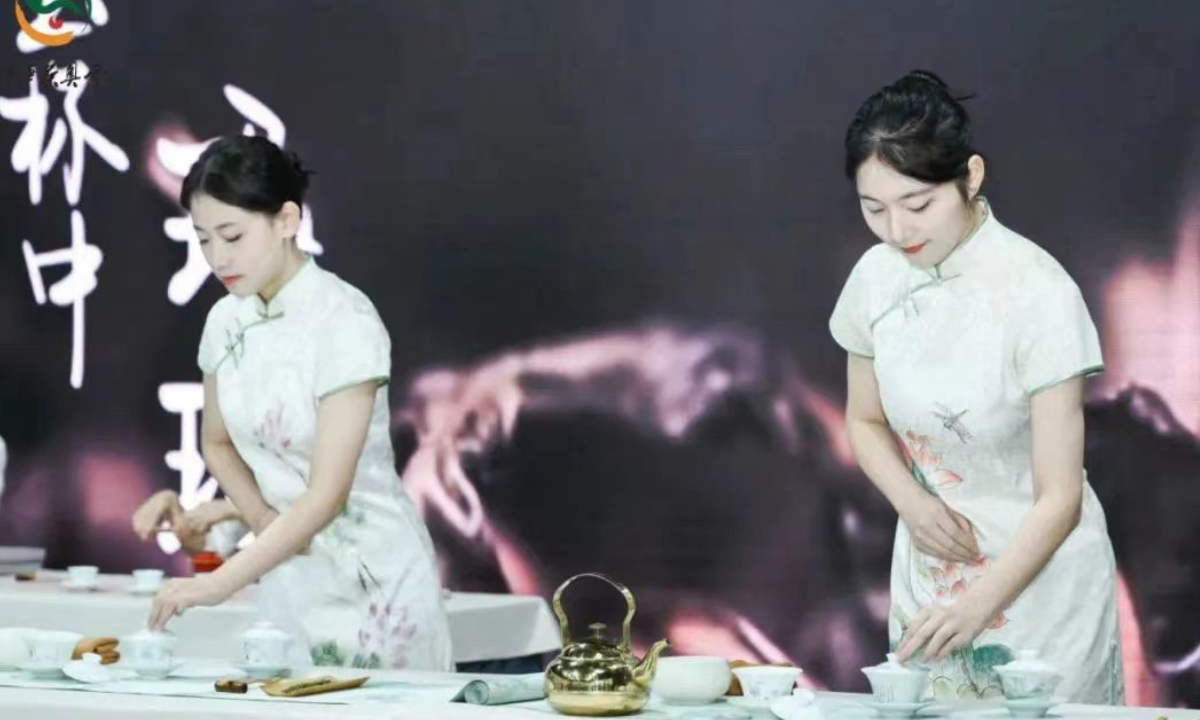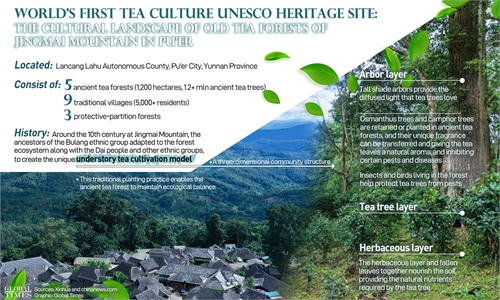ARTS / CULTURE & LEISURE
9th Chinese Tea Wonderful Game unveils diversity of brewing excellence
New-style tea making increasing impact

Photo: Courtesy of the 9th Chinese Tea Wonderful Game
"Participating in the 9th Chinese Tea Wonderful Game brought me a lot of positive emotions. It was an exciting process and very interesting and memorable," Anna Dragunova from Russia told the Global Times on Tuesday.
The 21-year-old is studying at the Tourism College of Zhejiang and has just won the gold award in the foreign participants category of the 9th Tea Wonderful Game held in the West Lake District of East China's Zhejiang Province.
In a three-day meeting for tea enthusiasts from around the globe, the event concluded at Longwu Tea Town. As the nation's first tea-themed event with tea enthusiasts and businesses taking center stage, the event celebrated tea culture.
The event covers major areas of tea culture, the tea industry and tea technology, including tea art competitions, Song Dynasty (960-1279) tea battles, new-style tea brewing competitions, and tea table and tea space design competitions.
Over 1,000 contestants advanced to the final round, resulting in the awarding of 31 gold medals, 61 silver medals, and 90 bronze medals. With a total of 182 medals, this edition of the tea games has set records for the highest number of competition categories, the largest participant turnout, and the broadest geographical representation in the history of the event.
Wu Ruixue, a 36-year-old chief flight attendant at the Zhejiang branch of China International Airlines, told the Global Times that she developed an affinity for tea in 2013 and began studying tea in 2017.
In this year's games, she showcased outstanding comprehensive performance in creativity of themes, tea table arrangement, tea infusion quality, tea artistry techniques, and more. Wu was awarded the silver prize in the tea artistry competition set for "sisters." In addition to traditional competitions, this year's tea games featured events such as the international contest, titled My Story with Chinese Tea.
"I like to drink tea in Russia, but the art of making tea in China has amazed me. This is an amazing process; it is very beautiful and wonderful," Dragunova said. Besides tea competitions, activities such as Chinese tea parties, cultural fairs and salons, which aim to promote tea culture, facilitate the development of the tea industry, and advance tea technology, have also been held.
Rise of new-style tea beverages
This year's event highlighted the rising trend of new-style tea beverages, including milk tea, herbal tea, fruit tea, tea-infused alcohol, and tea with coffee.
With convenient preparation, affordability, and a broad range of flavors, these contemporary tea drinks have gained popularity, particularly among the younger demographic.
The new-style tea brewing competition at the game featured two categories: "new-style tea beverage products" and "creative new-style tea brewing." The former included wellness tea blends, milk tea brewing, and special tea-infused mixes. Contestants in the latter category had the freedom to create innovative tea beverages. This competition attracted enthusiastic participation from tea professionals nationwide, including tea-major students, practitioners in new-style tea brewing, and seasoned tea enthusiasts. A total of 121 participants took part in the competition, and 30 teams comprising 66 individuals qualified for the finals.
Since the establishment of the "mixologist" as a new profession by the Ministry of Human Resources and Social Security in March 2021, the development of new-style tea drinks has entered a new era.
This trend is evident in the composition of participants in the new-style tea brewing competition, where the average age of contestants is under 30.
Diverging from traditional milk tea, new-style tea beverages are crafted using "high-quality tea leaves, combined with concentrated extracts obtained through various extraction methods, and infused with fresh milk, imported cream, natural animal cream, or a variety of fresh fruits. The flavors have expanded from the original tea and milk to include original tea, tea and fresh milk, tea and fruit, tea and cheese, and other fresh and high-quality elements," according to the definition of new-style tea by the Qianzhan Industrial Research Institute, a Beijing-based think tank.
"The rise of the new-style tea drink industry not only preserves traditional Chinese tea culture but also integrates with current market trends, becoming one of the most dynamic and popular forms of consumption," said Shao Jiancheng, deputy director of the rural industry development department of the Ministry of Agriculture and Rural Affairs, during a thematic salon titled "New-style Tea Drinks: Making the World More Flavorful" during the event.
According to the Xinhua News Agency, the market size of the new-style tea drink industry exceeded 290 billion yuan in 2022, with approximately 450,000 stores nationwide and consumption of over 200,000 tons of tea annually.
"New-style tea drinks have entered the era of globalization, presenting a unique blend of Chinese tea culture with a 'harmony in diversity' approach,' making the world more flavorful," founder of the National Cha Lab Luo Jun noted at the salon.


